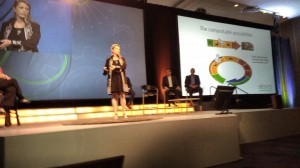From touchdown to trash talk – compostable food ware is a ‘must have’ for consumers today
February 5, 2016
How to cut the waste out of sampling!
April 19, 20163 Lessons in Sustainable Packaging
2015 was a big year for the “hot topic” of sustainability – did anything really change?
You may have noticed more conversations surrounding reducing our impact on the environment, climate change, composting, sustainable brands and all the rest – but did anything really change?
Here are our top 3 lessons on sustainable packaging that we learned in 2015 – a year in review at BSIbio.
Lesson #1: Stand by the science
Policy adaptations designed to support sustainable development and operations should be supported by scientific evidence. This is not news, however BSIbio as a company has taken the initiative to re-emphasize the science behind certified compostable products. This is how we embody our founding principle that certified compostable products can significantly help reduce and divert organic waste from landfill.
“The science is the same in Europe, as it is in Asia and North America. Empirical evidence is not different from place to place.” – Susanna Carson, CEO at BSIbio presenting at the annual Zero Waste Conference hosted by Metro Vancouver. Susanna co-chairs the product design & packaging working group for the National Zero Waste Council (NZWC).
Our challenge, in the bio-based packaging world, is not scientific. Our research this year has shown that certified compostable products, even PLA, do disintegrate and biodegrade in a reasonable amount of time in the right commercial compost conditions. The challenge is getting everyone, from manufacturer, to 3rd party compostable certifiers, to consumers, to policy-makers and waste facilities to work together. Which brings us to lesson #2…
Lesson #2: Don’t Hesitate, Collaborate
A diverse group of people tackling the same challenge make for a challenging path, but the final solution is bound to be effective. When you take on a sustainability challenge yourself, either as an individual or a company, it’s an uphill battle.
How do you collaborate?
First step is to share your goals. Even if you need to re-work those goals to match reality, you’ve got a much better chance getting the support and information you need to go waste-free or carbon neutral if you share your ideas with people.
Second step is diversify. Share your goals and ideas with people you’ve never spoken to before. Everyone in the sustainability field has different ideas on how to tackle a problem, and we are all innovators in our own way. We attended Future’s Strategies’ Leverage Lab Conference this year and saw collaboration across industries in action.
Third step is to implement, and adjust. If you’re not seeing the waste diversion you’d like to, can you communicate your goals better? Can you adjust what materials you’re purchasing to increase your diversion rates? The lesson here is if it’s difficult, don’t give up, keep going through the steps and accept small wins as you see progress.
Lesson #3: Little Company, BIG Impact
Small businesses make up 98% of all businesses in BC. Collaboratively, we can make a big impact when our needs are the needs of many. At BSIbio we met amazing small businesses through Climate Smart, which are innovating at both small and large scales to reduce their environmental impact.
Our contribution to the bio-packaging industry and research this year was a huge undertaking with a big impact – we worked with academia and our house brand BÉSICS® to establish protocols to help organic waste facilities test compostable products.
What does field testing compostable products mean?
To be certified, compostable products are tested in a lab to ensure that they breakdown quickly into usable soil. The laboratory conditions are not quite the same as real-world composting, so we wanted to take our products to the next level and test them on site at real compost/organic waste facilities to prove they breakdown correctly under natural conditions. Did our products degrade at facilities? You bet.
Read more about our research project here.
Looking ahead we will:
- celebrate our 11th birthday this year! We can’t believe how time flies and we are so proud to continue to serve our environmentally conscious customers.
- continue to be valuable contributors to our industry. Just last week Susanna and Emily, our Compost Specialist, presented at the US Composting Council in Jacksonville, Florida.
- continue to work with waste facilities to help them deal with perceived contamination issues.
- launch more quality compostable products to meet the demand of our increasingly environmentally conscious society
Tweet the top 3 lessons in sustainable packaging to your network!

